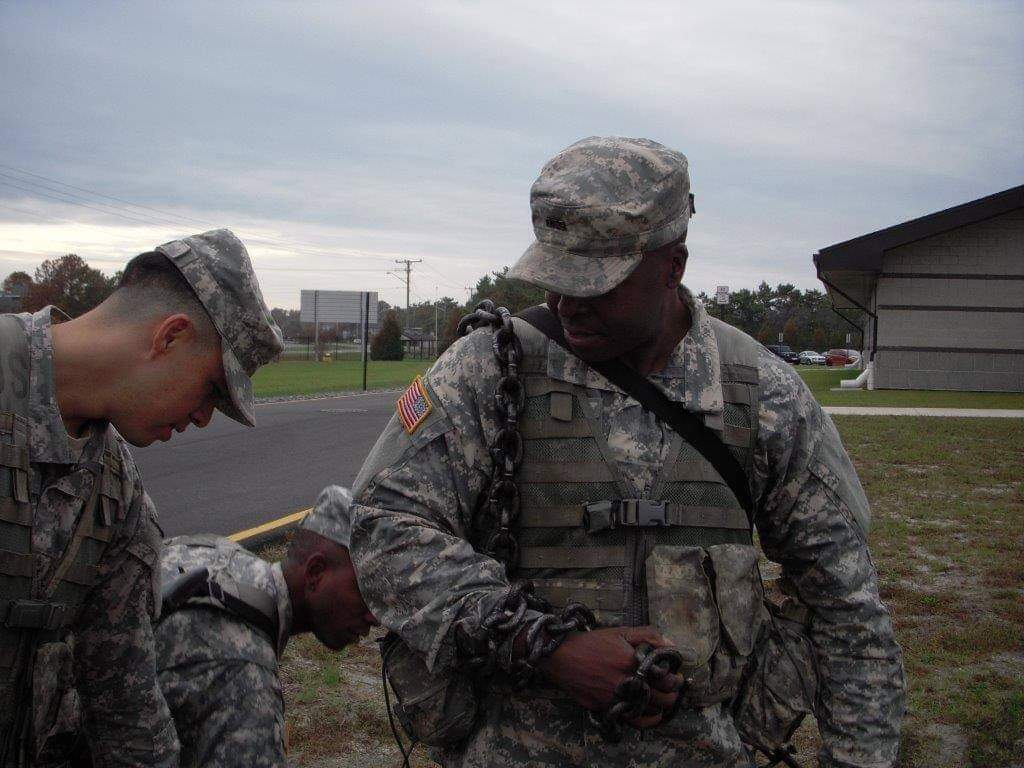
Black National Guard soldier may reenter officer school after being forced to wear chain
Maryland National Guard Sgt. Bruce Weaver was made to wear a chain as discipline. (Photo: Bruce Weaver)
WASHINGTON – A Black soldier forced to wear a chain as discipline will be able to reenter officer candidate school after the Maryland National Guard announced Wednesday it would not challenge the finding that Sgt. Bruce Weaver was discriminated against.
In a decision for the National Guard Bureau last month, Bernard Doyle found that Weaver had substantiated his claims of discrimination and harassment “based upon his race” when he was in officer candidate school in 2015. The bureau called the discipline “the most humiliating punishment imaginable” for a Black soldier. Doyle said Weaver should be offered the chance to complete the course or other means to compensate him and recommended that Maryland consider disciplinary action against officials responsible for the discrimination, according to a copy of the decision obtained by USA TODAY.
The Maryland National Guard will request an exception to the age limit of 42 for soldiers to commission as officers, Maj. Kurt Rauschenberg, a spokesman for the Maryland National Guard, told USA TODAY on Wednesday. Weaver, who filed his initial complaint in 2017, is 44.
Bruce Weaver is a Black National Guardsman who was forced to wear a chain as punishment. Weaver and his wife, Kaye Evans-Lutterodt, are parents to 18-month-old Oliver Weaver. (Photo: Doug Kapustin for USA TODAY)
“The Maryland National Guard carefully reviewed the hearing examiner’s recommendations and is requesting an exception to policy from the National Guard Bureau that may grant an age-restricting waiver for the Soldier to re-enroll in Officer Candidate School,” Rauschenberg said in an email.
Weaver declined to comment on the decision by the Maryland National Guard.
Weaver’s case, first detailed by USA TODAY, dates to November 2015 when he was ordered to carry a heavy chain for three days as punishment for leaving a training site without authorization, a charge he disputed. In 2017, Weaver filed a formal complaint of discrimination after he was removed from the officer candidate program for failing to progress. His complaint triggered a series of investigations by Maryland officials, each of which rejected his claims.
One of the instructors involved in the incident told USA TODAY that the chain was intended to drive home the importance of the chain of command, the military’s adherence to following orders. In 2015, all of the instructors in the Maryland officer candidate school were white. Maryland officials discontinued the use of chains for punishment in 2017, conceding their use could be interpreted as racist. Its instructor cadre is now made up of 10 white troops, six Black and one Hispanic member, according to the Maryland National Guard.
About one-third of Maryland’s Army National Guard troops are Black, compared with 15% of those serving in the Army National Guard nationwide. About 25% of Maryland’s officer corps are people of color, including Black, Asian American and American Indian troops.
The National Guard Bureau, a coordinating body for the country’s state and territorial Guard units, investigated Weaver’s complaint, substantiated most of his allegations of discrimination and harassment and blasted Maryland for mishandling his case.
The Maryland National Guard appealed that decision. Its top officer, Maj. Gen. Timothy Gowen, fired off an angry letter accusing the bureau’s Office of Equity and Inclusion of attacking the state with “erroneous and unsupported allegations.” Gowen charged that it acted as an advocate for Weaver and another Black Guardsman who filed a complaint, instead of performing its mandated role as a “neutral third party.”
That set the stage for Doyle who heard arguments from both sides. Doyle sided mostly with Weaver.
Weaver’s case caught the attention of members of Congress with oversight responsibility for the military. Rep. Jackie Speier, D-Calif., who chairs a House Armed Services Committee panel on personnel, criticized the Maryland Guard’s investigation and called for swift punishment for those involved in disciplining Weaver.
“Yet another case of military commanders self-investigating and coming up ‘clean,’ and only when an OUTSIDE investigator steps in is the truth exposed. The cruelty and degradation of forcing a Black service member to wear chains is beyond vile and inhuman,” Speier said in a statement. “Congress must get serious about addressing rampant racism in the military, and throughout our country and society, as well as ending the ‘good old boys club’ mentality that continues to result in injustice and abuse. And those who tolerated this disgusting behavior must be discharged dishonorably.”
Source: Read Full Article
